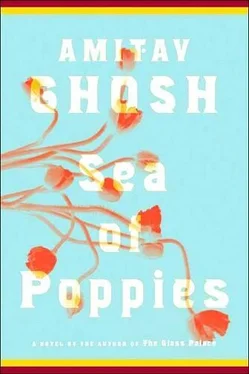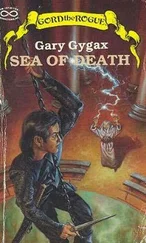Through the Reverend's influence, Benjamin Burnham found a position as a clerk with the trading firm of Magniac & Co., the predecessors of Jardine & Matheson, and from then on, as with every other foreigner involved in the China trade, his time was divided between the two poles of the Pearl River Delta – Canton and Macao, eighty miles apart. Only the winter trading-season was spent in Canton: for the rest of the year the traders lived in Macao, where the Company maintained an extensive network of godowns, bankshalls and factories.
'Ben Burnham did his time, offloading opium from receiving-ships, but he wasn't the kind of man who could be happy on another man's payroll, drawing a monthly tuncaw: he wanted to be a nabob in his own right, with his own seat at the Calcutta opium auction.' As with many another Fanqui merchant in Canton, Burnham's church connections were a great help, since several missionaries had close connections with opium traders. In 1817, the year the East India Company gave him his articles of indenture as a free merchant, an opportunity presented itself in the form of a team of Chinese converts who had to be escorted to the Baptist Mission College in Serampore, in Bengal. 'And what better man to bring them in than Ben Burnham? Before you know it, he's in Calcutta, looking for a dufter – and what's more he finds one too. The good old Roger of Rascally gives him a set of chabees to a house on the Strand!'
Burnham's intention in moving to Calcutta was to position himself to bid in the opium auctions of the East India Company: yet it was not the China trade that provided him with his first financial coup; this came, rather, from his boyhood training in another branch of the British Empire 's commerce. 'In the good old days people used to say there were only two things to be exported from Calcutta: thugs and drugs – or opium and coolies as some would have it.'
Benjamin Burnham's first successful bid was for the transportation of convicts. Calcutta was then the principal conduit through which Indian prisoners were shipped to the British Empire's network of island prisons – Penang, Bencoolen, Port Blair and Mauritius. Like a great stream of silt, thousands of Pindaris, Thugs, dacoits, rebels, head-hunters and hooligans were carried away by the muddy waters of the Hooghly to be dispersed around the Indian Ocean, in the various island jails where the British incarcerated their enemies.
To find a kippage for a convict ship was no easy matter, for many a seaman would heave sharp about at the prospect of signing on to a vessel with a cargo of cutthroats. 'In his hour of need, Burnham broached his business by calling upon a friend from his chocolateering days, one Charles Chillingworth, a ship's master of whom it would come to be said that there was no better manganizer at large on the ocean – not a single slave, convict or coolie had ever escaped his custody and lived to gup about it.' With Chillingworth's help, Benjamin Burnham seived a fortune from the tide of transportees that was flowing out of Calcutta, and this inflow of capital allowed him to enter the China trade on an even bigger scale than he had envisaged: soon he was running a sizeable fleet of his own ships. By his early thirties, he had formed a partnership with two of his brothers, and the firm had become a leading trading house, with agents and dufters in such cities as Bombay, Singapore, Aden, Canton, Macao, London and Boston.
'So there you are: that's the jadoo of the colonies. A boy who's crawled up through the hawse-holes can become as grand a sahib as any twice-born Company man. Every door in Calcutta thrown open. Burra-khanas at Government House. Choti hazri at Fort William. No BeeBee so great as to be durwauza-bund when he comes calling. His personal shoke might be for Low-Church evangelism, but you can be sure the Bishop always has a pew waiting for him. And to seal it all, Miss Catherine Bradshaw for a wife – about as pucka a mem-sahib as ever there was, a brigadier's daughter.'
*
The qualities that had made Ben Burnham into a merchant-nabob were amply in evidence during his tour of the Ibis : he examined the vessel from stem to stern, even descending to the keelson and mounting the jib-boom, noting everything that merited attention, either by way of praise or blame.
'And how does she sail, Mr Reid?'
'Oh she's a fine old barkey, sir,' said Zachary. 'Swims like a swan and steers like a shark.'
Mr Burnham smiled in appreciation of Zachary's enthusiasm. 'Good.'
Only when his inspection was over did the shipowner listen to Zachary's narrative of the disastrous voyage from Baltimore, questioning him carefully on the details while thumbing through the ship's log. At the end of the cross-examination, he pronounced himself satisfied and clapped Zachary on the back: 'Shahbash! You bore up very well, under the circumstances.'
Such reservations as Mr Burnham had concerned chiefly the lascar crew and its leader: 'That old Mug of a serang: what makes you think he can be trusted?'
'Mug, sir?' said Zachary, knitting his brows.
'That's what they call the Arakanese in these parts,' said Burnham. 'The very word strikes terror into the natives of the coast. Fearsome bunch the Mugs – pirates to a man, they say.'
'Serang Ali? A pirate?' Zachary smiled to think of his own initial response to the serang and how absurd it seemed in retrospect. 'He may look a bit of a Tartar, sir, but he's no more a pirate than I am: if he was, he'd have made off with the Ibis long before we dropped anchor. Certainly I couldn't have stopped him.'
Burnham directed his piercing gaze directly into Zachary's eyes. 'You'll vouch for him, will you?'
'Yes, sir.'
'All right then. But I'd still keep a weather eye on him, if I were you.' Closing the ship's log, Mr Burnham turned his attention to the correspondence that had accumulated over the course of the voyage. M. d'Epinay's letter from Mauritius seemed particularly to catch his interest, especially after Zachary reported the planter's parting words about his sugar-cane rotting in the fields and his desperate need for coolies.
Scratching his chin, Mr Burnham said, 'What do you say, Reid? Would you be inclined to head back to the Mauritius Islands soon?'
'Me, sir?' Zachary had thought that he would be spending several months ashore, refitting the Ibis , and was hard put to respond to this sudden change of plan. Seeing him hesitate, the shipowner added an explanation: 'The Ibis won't be carrying opium on her first voyage, Reid. The Chinese have been making trouble on that score and until such time as they can be made to understand the benefits of Free Trade, I'm not going to send any more shipments to Canton. Till then, this vessel is going to do just the kind of work she was intended for.'
The suggestion startled Zachary: 'D'you mean to use her as a slaver, sir? But have not your English laws outlawed that trade?'
'That is true,' Mr Burnham nodded. 'Yes indeed they have, Reid. It's sad but true that there are many who'll stop at nothing to halt the march of human freedom.'
'Freedom, sir?' said Zachary, wondering if he had misheard.
His doubts were quickly put at rest. 'Freedom, yes, exactly,' said Mr Burnham. 'Isn't that what the mastery of the white man means for the lesser races? As I see it, Reid, the Africa trade was the greatest exercise in freedom since God led the children of Israel out of Egypt. Consider, Reid, the situation of a so-called slave in the Carolinas – is he not more free than his brethren in Africa, groaning under the rule of some dark tyrant?'
Zachary tugged his ear-lobe. 'Well sir, if slavery is freedom then I'm glad I don't have to make a meal of it. Whips and chains are not much to my taste.'
'Oh come now, Reid!' said Mr Burnham. 'The march to the shining city is never without pain, is it? Didn't the Israelites suffer in the desert?'
Читать дальше












